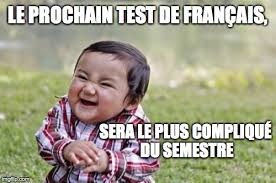 Should you use futur simple or futur proche? Why?
Should you use futur simple or futur proche? Why?
I will buy a house.
Futur Simple because buying a house is not in the near future.
Je ______ (finir) les études un jour
Je finirai les études un jour
What are the endings for all the subjects in the futur simple ? Make a verb chart with them.
Je -ai Nous -ons
Tu -as Vous -ez
Il/Elle -a Ils/Elles -ont
I will see
Je verrai
J'etudierai beaucoup pour l'examen."
J'etudierai beaucoup pour l'examen."
I will study a lot for the test.
Futur Proche or Futur Simple? Why?
If a 6th grader is talking about graduating from High School.

Futur Simple for a 6th grader because they are far from graduating.
Il _______ (se marier) avec sa petite amie / sa copine
Il se mariera avec sa petite amie / sa copine
le Futur Simple shares verb stems with what other verb tense? what is the difference between that tense and le futur simple?
le conditional. The endings for le conditionnel come from the imparfait, and the futur simple has its own endings.
They will not like to work at school
Ils n'aimeront pas travailler à l'école
Prononcez la phrase :
Est-ce que vous feriez la queue pour les billets ?
Est-ce que vous feriez la queue pour les billets ?
Will you (y'all) wait in line for tickets?
Should you use Futur Proche or Futur Simple? Why?
I'm going to go to the store. Do you need something?
Translate
Futur Proche because it is happening instantly.
Je vais aller au magasin. Tu as besoin de quelque chose?
Nous ___________ (réussir) le français cette année
nous réussirons le français cette année
Give the futur simple verb stems for the following :
parler
vendre
choisir
parler (to speak) : parler-
vendre (to sell) : vendr-
choisir (to choose) : choisir-
How to do you put le Futur Simple in the negative? Give an example
the ne and pas go around the stem and ending
*je ne danserai pas*
Prononcez la phrase :
Qu'est-ce qu'il achetera en vacances, tu penses ?
Qu'est-ce qu'il achetera en vacances, tu penses ?
What do you think he will buy on vacation?
Futur proche ou futur simple ? Decidez et traduisez :
My grandma is going to call me tonight.
FP : Ma grand-mère va m'appeler ce soir.
Il ________ (devenir) ingénieur après ses études
Il deviendra ingénieur après ses études
Give the futur simple verb stems for the following :
Avoir
Etre
Aller
Faire
Venir
Avoir (to have) : aur-
Etre (to be) : ser-
Aller (to go) : ir-
Faire (to do/ to make) : fer-
Venir (to come): viendr-
Arrange these pieces so that they form a logical futur proche phrase :
Quand / nous / etre / vieux / nous / avoir / beaucoup d'argent
Quand nous serons vieux, nous aurons beaucoup d'argent.
Prononcez la phrase :
Quand ils seront vielles, ils auront beaucoup d'argent.
Quand ils seront vielles, ils auront beaucoup d'argent.
When they're old, they will have a lot of money.
Futur proche ou futur simple ? Decidez et traduisez :
They won't travel next year if there are travel restrictions*. (*restrictions de voyage)
FS : Ils ne voyageront pas l'année prochaine s'il y a des restrictions de voyage.
Vous ________ (pouvoir) conduire après que vous _______ (recevoir) votre permis de conduire
Vous pourrez conduire après que vous recevrez votre permis de conduire
Traduisez en francais :
Will you (plural) tell Pascal that I said* hi?
Est-ce que : Est-ce que vous direz à Pascal que j'ai dit salut ?
Statement: Vous direz à Pascal que j'ai dit salut ?
Inversion : Direz-vous à Pascal que j'ai dit salut ?
Arrange these pieces so that they form a logical futur proche phrase AND TRANSLATE :
Quand / ils / avoir 24 ans / ils / finir leurs études
Quand ils auront 24 ans, ils finiront leurs études.
When they're 24, they will finish their studies.
Prononcez la phrase :
Ou est-ce que tu etudieras quand tu finiras le lycee ?
Ou est-ce que tu etudieras quand tu finiras le lycee ?
Where are you going to study when you finish high school?